The Hunger Games: 7 Things That Don't Make Any Sense

Is there a better movie based on a dystopian young adult novel than The Hunger Games? Director Gary Ross’ big screen take on Suzanne Collins’ story of a future in which children are pitted against each other in a deadly test of resilience, in addition to propelling Jennifer Lawrence to worldwide stardom, became a rare achievement in book adaptations appealing to both fans and critics.
I am one of those fans who, in 2012, unexpectedly found myself enamored by the novel (and it subsequent sequels) and quite satisfied by the film (and one of its sequels) as a potent commentary on America’s enduring obsession with violence. However, that is not to say that the first The Hunger Games movie to be perfect. There are a handful of things that still don't make much sense.
So, who is brave enough to point out a few of The Hunger Games’ more nonsensical moments? I guess I’ll volunteer as tribute. These are seven narrative elements of the film that put the odds less in its favor.
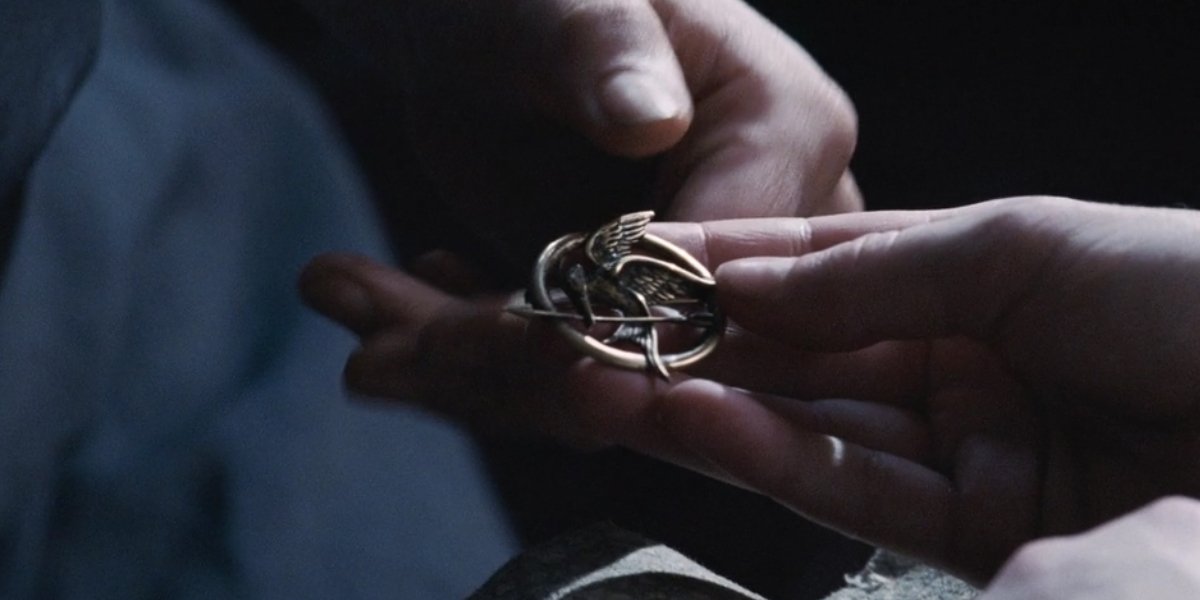
Why Do Prim And Katniss Still See The Mockingjay Pin As A “Good Luck” Charm?
On the first Reaping Day that 12-year-old Primrose (Willow Shields) is eligible to be chosen as District 12’s Hunger Games tribute, her 16-year-old sister, Katniss Everdeen (Jennifer Lawrence), cheers her up with a pin bearing the symbol of a Mockingjay for protection. When District 12’s Capitol representative Effie Trinket (Elizabeth Banks) calls Prim’s name, Katniss steps in to volunteer instead. In their final moment together before Katniss is to leave, her little sister gives back the pin in hopes that it will protect her in the arena.
Are you sure, Prim, that you want to put your faith into something you were wearing when you received your own death sentence for your sister’s protection? Now, since the Mockingjay eventually becomes an important symbol of Katniss’ heroic arc and series’ central theme of rebellion, for the sake of the story, Prim returning the pin is justified, but her reason is not. In fact, considering how “lucky” that thing had been by that point, I would have handed it off to Peeta, because if anyone is lucky enough to cancel out the pin’s misfortune, it is him. Case in point…
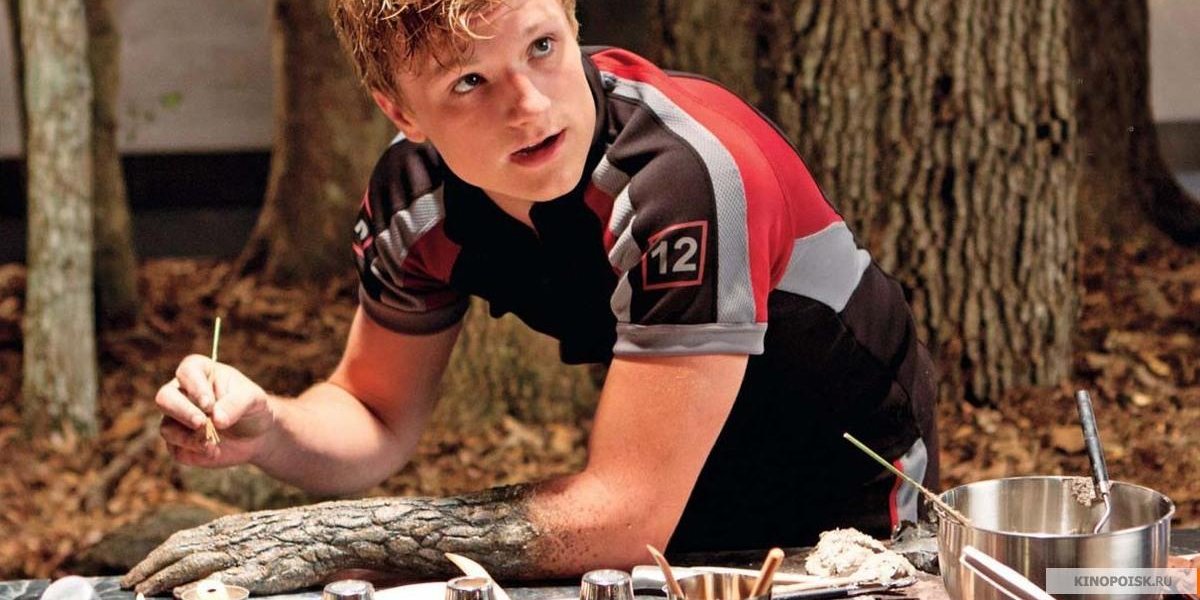
How Does Decorating Cakes Make Peeta Such A Master Of Disguise?
Chosen as District 12’s 74th male tribute is Peeta Mellark (Josh Hutcherson), who works with his family as a baker in the middle of an impoverished state that is still somehow struggling to acquire food. I am going to ignore that inconsistency, however, because that is not nearly as impressive to how that skills actually help him in the Hunger Games.
Each tribute selects a specific talent they present to potential sponsors (such as Katniss’ archery or Cato’s swordsmanship) and Peeta chooses camouflage, citing applying frosting on cakes at the bakery as his de facto training. He’s good enough at it that Katniss just barely notices him under makeup that uncannily blends with a riverside rock formation. While Peeta’s talent at least gives him an interesting character element, I cannot envision a strong connection between dessert decoration and masterful disguise, unless there is some special military unit of bakers specializing in covert operations that we do not know about.
Your Daily Blend of Entertainment News
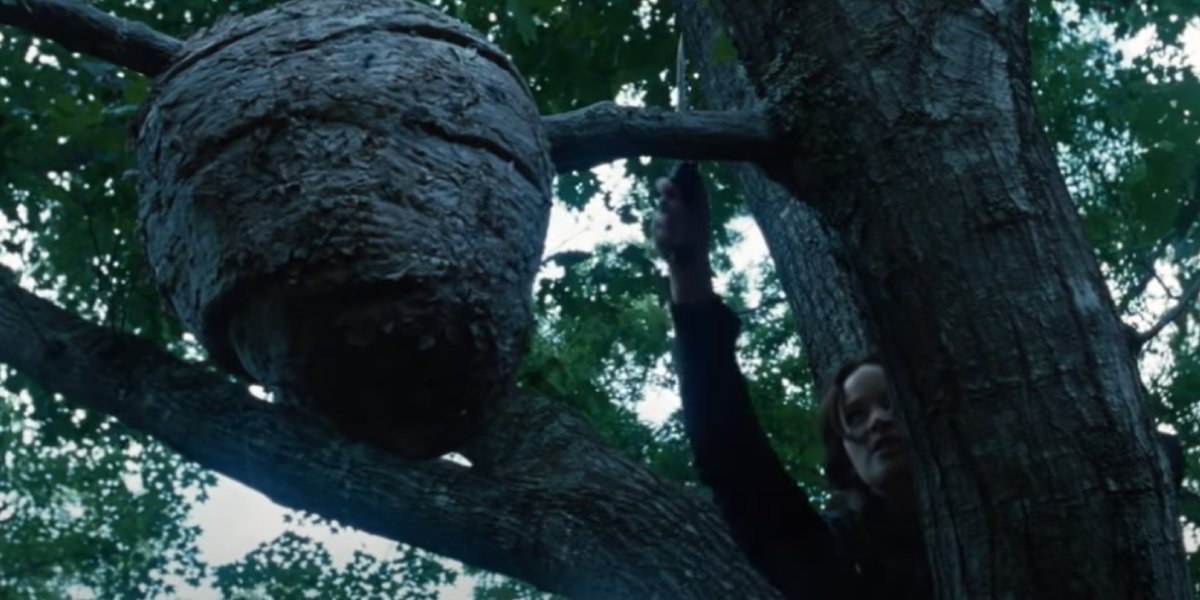
How Does Katniss Survive Multiple Tracker Jacker Stings?
Of all of The Hunger Games’ graphically challenging scenes, I find myself cringing the most when Katniss drops a nest of tracker jackers from a tree onto her sleeping opponents. The severe risk she takes is made clear by announcer Claudius Templesmith’s (Toby Jones) assurance that the genetically engineered wasps are “very lethal,” to which co-host Caesar Flickerman (Stanley Tucci) adds that their venom is painful, hallucinogenic, and, “in extreme cases,” deadly.
Firstly, Flickerman’s statement that tracker jackers cause death “in extreme cases” is just a tad contradictory to Templesmith’s affirmation of their lethality (which is “very”). I, not a Panem citizen myself, cannot be certain of all that constitutes as an “extreme case” for the insects, but I question how Katniss can still come out breathing after suffering that many stings, even Rue’s (Amandla Stenberg) emergency leaf treatment. Not to mention, the hallucinations she does begin to endure do not really add up either.
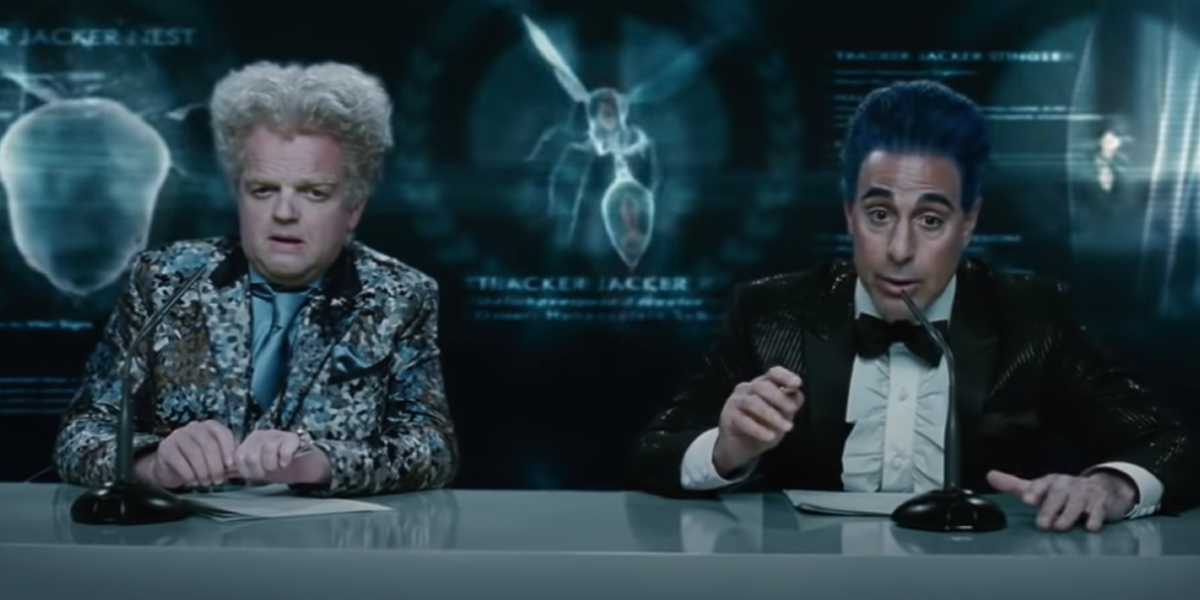
How Is Caesar Flickerman’s Tracker Jacker Lesson Echoed In Katniss’ Hallucination?
After escaping the treetop by repelling her opposing tributes (and indirectly killing one, who conveniently happens to be a fellow archer) with tracker jackers, Katniss begins to fall prey to some nightmarish visions courtesy of their genetically engineered venom. Among her apparitions is Caesar Flickerman, quoting his earlier mention of the “powerful hallucinations” caused by a sting.
Wait a minute… Of course, Panem citizens watching the Hunger Games heard Flickerman talk about tracker jackers and anyone in reality watching the movie heard of him say that, but Katniss, stuck in the arena at this point, did not. Therefore, how did this televised moment find its way into her subconscious? I suppose I’d be willing to believe the Capitol has the resources to create a hallucinogen powerful enough to give someone ESP, but even that is a stretch.
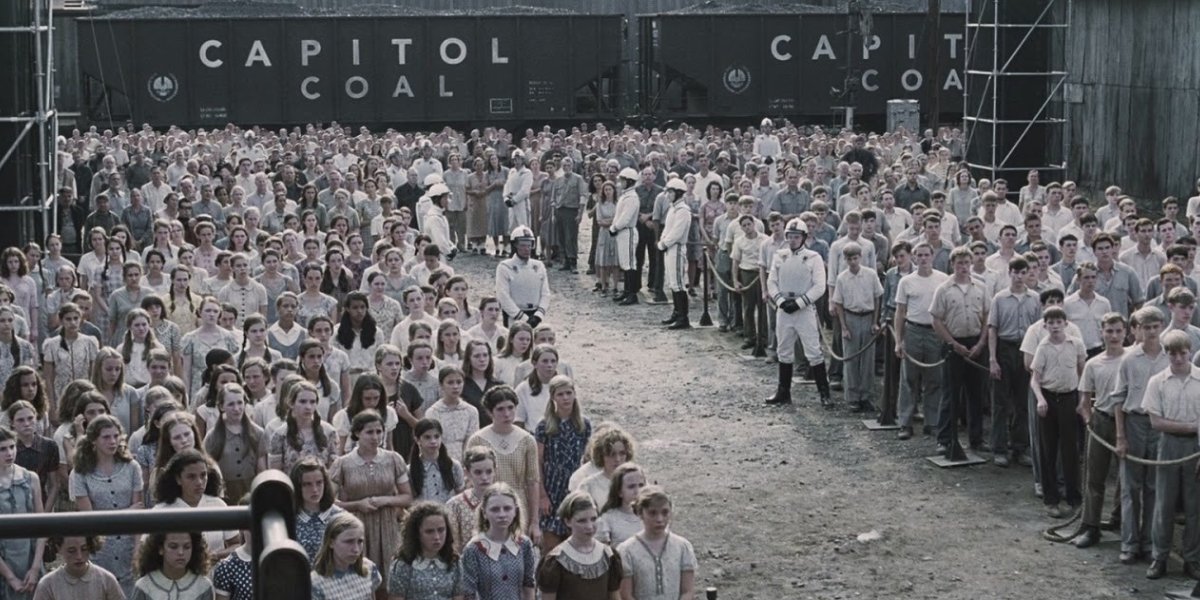
Why Does District 12 Make No Effort To Teach Their Children Survival Skills?
You know, as much as I despise career tribute Cato (Alexander Ludwig), I have to give District 2 credit for giving him the means to enter the arena prepared (even though the volunteer was never really required to go in the first place). It truly justifies with how long he manages to survive, which makes me wonder why it is not a more common practice in Panem.
The people of District 12, for instance spend every year leading up to Reaping Day praying their child’s name does not get picked when it might be a better idea to make them as “vicious and ready to go” as Cato is by the next Hunger Games, or at the very least, teach them some basic survival skills in the event their name gets picked. Spend a few hours each day (hell, once a week would do) teaching them lessons in combat, stealth, and various survival techniques so, if their child’s name happens to be called as tribute, they could become the victor, or at least last longer than some helplessly beaten in a fight or having ingested some bad berries. Say, on that note…
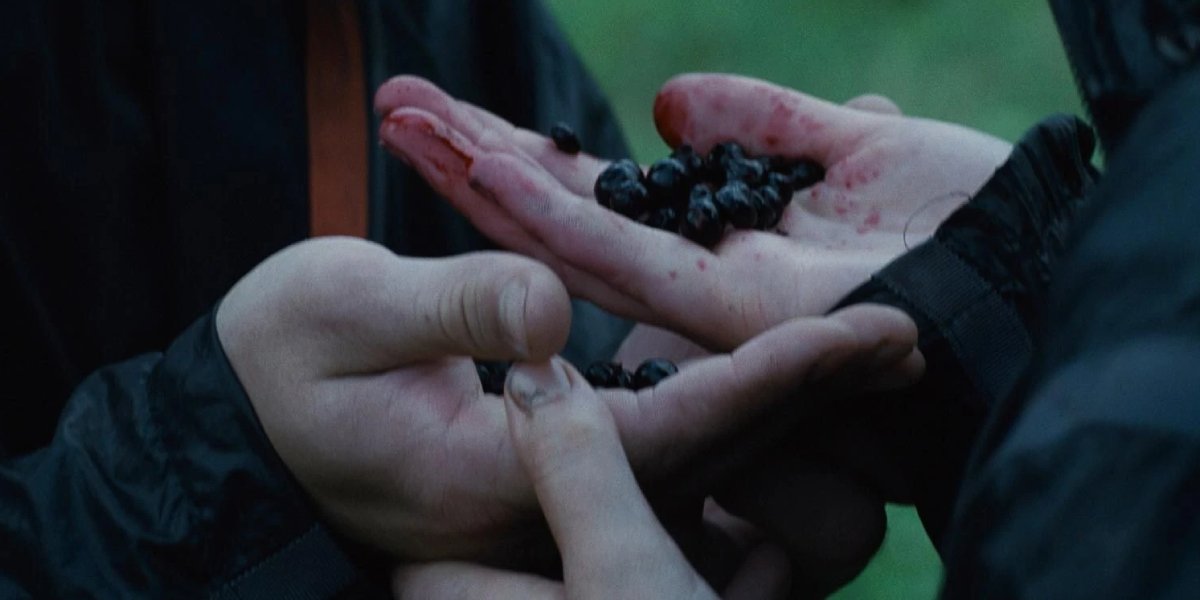
How Is Peeta Not Aware Of Nightlock’s Deadly Effects?
In spite of all the grisly ways the young tributes rid each other, some simply fall prey to the unfortunate mistake of eating Nightlock, a type of berry with poisonous effects. Of course, Katniss already knows to avoid them and even has to stop Peeta from eating a few himself, which is surprising.
You see, Katniss knows about the killer berries from an early childhood warning she received about them from her late father, who knew about the dangers of eating them because they are most prevalent in lands surrounding District 12. Peeta is also from District 12 and his parents never made an effort to mention anything about Nightlock to him as he grew up? Well, I’m glad he never stumbled upon any while searching for a new flavor of pastry because that would mean bad business for the bakery, and money is already tight around there… But, just why is that anyway?

Why Does The Capitol Not Just Use Their Resources To Eliminate Poverty Altogether?
Look at a place like District 12, with its rundown, hastily scrapped together society, and then look at the Capitol, inhabiting a selective few surrounded by nothing but luxury, and it becomes clear that there is something very wrong with this future. Since I first saw The Hunger Games, I could not help but wonder what it is exactly that is stopping the Capitol from using their resources to actually make Panem a more habitable environment.
I mean, given their seemingly unlimited wealth and the unfathomable things that scientific progress has allowed for them (instant injury healing cream, for instance), I do not think it would take much effort to, say, end world hunger with some sort of microwave that zaps up a whole feast in seconds or ensure every family has shelter with fireproof houses. The obvious answer as to why this is not the case, of course, is the fact that President Snow (Donald Sutherland) is an evil, ruthless, tyrannical bastard. Even so, would it not boost his approval ratings among the lesser privileged states if he actually showed them proof that he gave a damn and used his resources for good for once?
We may never know the answer to these puzzling questions, unless Suzanne Collins’ upcoming prequel novel (and inevitable movie) The Ballad of Songbirds and Snakes provides further insight. Until then, be sure to check back for more information and updates on the world of The Hunger Games here on CinemaBlend.

Jason Wiese writes feature stories for CinemaBlend. His occupation results from years dreaming of a filmmaking career, settling on a "professional film fan" career, studying journalism at Lindenwood University in St. Charles, MO (where he served as Culture Editor for its student-run print and online publications), and a brief stint of reviewing movies for fun. He would later continue that side-hustle of film criticism on TikTok (@wiesewisdom), where he posts videos on a semi-weekly basis. Look for his name in almost any article about Batman.
